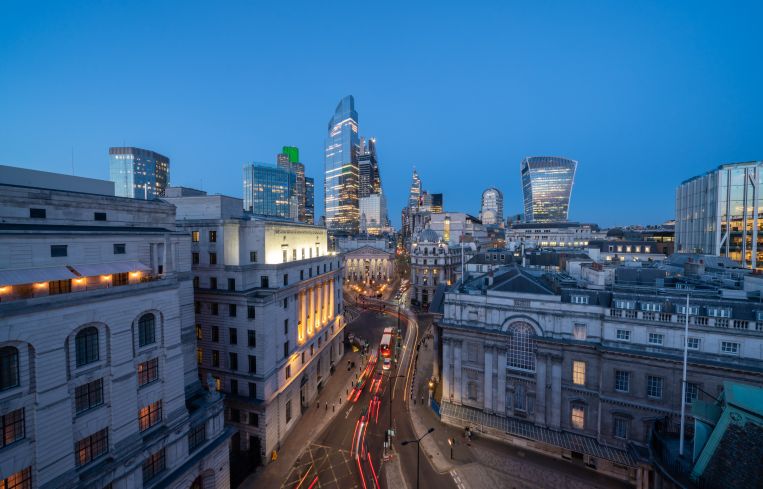Global Cities Post-Pandemic Have a Blueprint in London’s Recent Success
By Jace Tyrrell May 17, 2024 9:48 am
reprints
London has always been one of the world’s most iconic global hubs with a diverse talent pool, innovative business leaders, creative and immersive experiences, and a position as a gateway to Europe.
As a place that truly offers something for everyone, London was ranked No. 1 in the 2024 Resonance World’s Best Cities Report for the ninth straight year, coming top for both livability and lovability. So it’s no surprise then from a commercial real estate standpoint to see London ranked No. 1 the last five years in overall real estate investment, according to data from JLL.
For the five years ended February 2024, CRE investment in London totaled roughly $96.2 billion compared to New York’s $94.2 billion and San Francisco’s $86.5 billion. While multiple factors contribute to London’s growth, I boil it down to a few specific ones that can help North America.
The return of the city
The term “boomeranger” has come to define the many residents who have returned to cities across the world post-pandemic. I myself even boomeranged back to London from Australia! People missed the cultural, career and social opportunities that cities like London, New York and San Francisco can provide.

Gensler recently ran a return of the city report that showed Londoners are feeling significantly optimistic about work. Their data showed that 41 percent of Londoners feel their opportunities for career advancement have improved — a 26 percent increase from 2021. Similarly, 40 percent of Londoners think that employment opportunities in their city have improved, compared to 19 percent in 2021
More people are also moving in 2024 than in 2021, and where they want to move has changed. Fewer respondents want to move to the suburbs or rural areas, and 73 percent of those who move intend to relocate to a city, according to Gensler’s report. The most popular destination is a city with more people, indicating that the draw of density has rebounded after a time marked by social distancing. History shows us that cities rebound after pandemics — and the public health crisis of recent years looks to be no exception.
With consumer data to back it up, notable U.S. companies such as Andreessen Horowitz, Microsoft and Salesforce announced new London offices recently. The future of career advancement in London is bright then. Places like Queen Elizabeth Olympic Park, Canary Wharf, Battersea Power Station and the Knowledge Quarter around Kings Cross have all become rapidly growing areas for London development and global investment.
Plus, it’s beneficial to our world economy when transatlantic partnerships between London and New York, San Francisco and Seattle are thriving. We must collaborate and uplift our respective cities to provide more global job opportunities and prosperity.
A haven for sustainability and life sciences
London has ties to every major industry, ranging from gaming to fintech. However, the focus on green tech and life sciences has been top of mind of late. London has always been an ambitious leader with climate goals, striving to become a zero-carbon, zero-pollution city by 2030 and a zero-waste city by 2050.
Plus, London is a world-class leader when it comes to low-carbon real estate regeneration and new projects such as the Cavendish Square West End, a net-zero-carbon development, help cement that. The space will provide 280,000 square feet for additional life sciences companies in an area that already includes the Royal Society of Medicine, the Royal College of Nursing, the Royal Marsden Private Care, the King’s Fund and HCA Healthcare’s U.K. headquarters.
How does this relate to the States? Well, the Boston area is one potential partner we’re excited to explore collaboration with on this front knowing that life sciences is a dominant industry with over 120 significant life sciences companies in and around Kendall Square in Cambridge, Mass., as well as roughly 9 million square feet of new lab space planned. Plus, Boston Mayor Michelle Wu announced an additional $4.7 million in funding to help train residents for roughly 1,000 more life sciences jobs in Boston proper by 2025.
London and the United States have a real opportunity to expand upon a life sciences and innovation districts partnership that has already found some recent success. Some notable health care companies such as Recursion, Cleveland Clinic and Maven Clinic have all expanded to, or announced expansions to, London recently, showcasing the prominence of our transatlantic partnership.
Whilst London continues to be the most attractive global city in which to invest, it can also be complex to do so, and Opportunity London exists to smooth that path. Our London Investment Prospectus has the cross-party backing of every layer of government as well as the private sector, and sets out nearly $12.5 billion of investable opportunities right now.
Working hand in hand with cities like San Francisco, New York, Boston and Toronto, as well as key North American real estate state partners like Gensler and JLL, among others, will only improve our remarkable cities and strengthen our global ties.
Jace Tyrrell is the CEO of Opportunity London, a public-private partnership trying to boost investment in the British capital’s low-carbon real estate, energy and infrastructure



